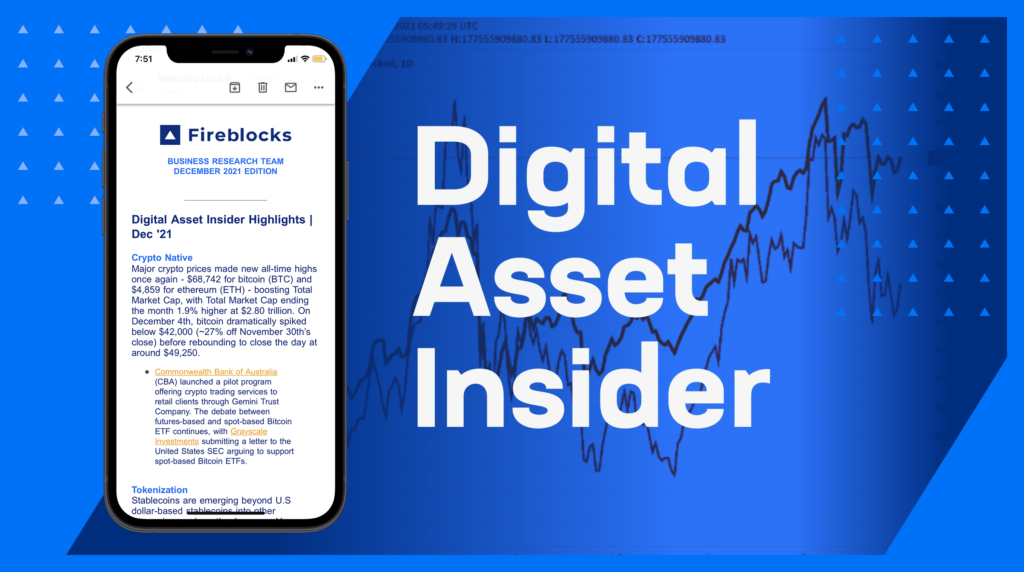Crypto Native
Major crypto prices made new all time highs ($68,742 for BTC and $4,859 for ETH) once again in November, with Total Market Cap ending the month 1.9% higher at $2.80 trillion, versus the prior month at $2.74 trillion. Existing holders of bitcoin took advantage of the fall in price early in the month: El Salvador reported to have purchased 100 bitcoin on November 26th and MicroStrategy purchased 7,002 bitcoins over the last two months at an average price of $59,187. On December 4th, bitcoin dramatically spiked below $42,000 (~27% off November 30th’s close) before rebounding to close the day at around $49,250. The crash in price was seen to be a move to clear out highly leveraged traders.
- Australia’s Commonwealth Bank of Australia (CBA) launched a pilot program offering cryptocurrency trading services to retail clients through Gemini Trust Company connected via a CBA account. This move by one Australia’s largest banks is prompting Australian regulators to examine their regulatory approach to digital assets because regulatory frameworks on providing retail customers to access unregulated digital assets are unclear.
- After the United States Securities Exchange Commission (SEC) began approving futures-based Bitcoin ETFs this year, Grayscale Investments attorneys submitted a letter arguing in favor of a spot-based bitcoin exchange traded fund (ETF). The letter argues that a futures-based bitcoin ETF references the same bitcoin pricing basis, and as such should be treated similarly. While futures-based ETFs approvals remain inconsistent, spot-based Bitcoin ETFs applications have never been approved; WisdomTree is the most recent firm to have their application rejected.
- On the heels of the approval of the futures-based bitcoin ETFs by the SEC, investment firm Kelly Strategic Management has filed for approval of a futures-based ethereum ETF called the Kelly Ethereum Ether Strategy ETF. The fund would be actively managed using cash-settled ether futures, which are only offered by the Chicago Mercantile Exchange.
- Goldman Sach is reported to be exploring digital asset based collateral loans, similar to what Signature Bank and Silvergate Bank are offering to their clients in exchange for fiat loans. In order to keep digital assets such as bitcoin from being directly held on their balance sheet, the bank would look to use a tri-party repo arrangement, according to a CoinDesk report.
Tokenization
The use cases and required technology for tokenization are much better understood by institutions and regulators. Partnerships will continue to form between technology providers and firms who have already developed platforms for interested participants. Stablecoins are emerging beyond U.S. dollar-based stablecoins into other currencies, such as the Japanese Yen. Despite future availability of central bank issued CBDCs, we predict stablecoins will expand into other major currencies over the next 12-18 months.
- Goldman Sachs announced it is partnering with Digital Assets to develop its own “end-to-end tokenized asset infrastructure” using the DAML development platform. This platform uses DAML-based smart contracts as a core component for on-chain applications. Global Head of Digital Assets, Matthew McDermont, said tokenization can take two forms. The first is the tokenization of a traditionally issued asset which is then traded on-chain, and the second is the native token issuance of the asset directly from the blockchain, which takes advantage of the programmability of smart contracts.
- ADDX, Singapore’s digital tokenization and exchange platform, and Japanese securities firm Tokai Tokyo Financial Holdings, have formed a partnership to offer security tokens, starting with Japanese real estate. ADDX currently offers accredited investors access to security tokens of private equity funds, hedge funds, and private debt.
- In November, Coinbase Pro launched “GYEN”, a yen-pegged stablecoin issued by GMO-Z.com Trust. Circle announced plans to invest in a Japanese Yen stablecoin through its new investment arm, Circle Ventures. A new privately issued yen-based digital currency, “DCJPY”, would be trialed and launched by a consortium of Japanese companies backed by bank deposits, including banks like Mizuho Financial Group and Sumitomo Mitsui Financial Group, and corporates like East Japan Railway Co and Kansai Electric Power Co Inc.
Regulation | Regulators
United States regulators are seeking Congress to initiate regulation over stablecoins and develop clearer regulation on the taxation of digital assets. Tax authorities in the European Union are taking their own jurisdictional steps to tax digital assets, as are Asian tax authorities and legislators who are facing their own hurdles in taxing investors.
- India’s Securities and Exchange Board of India (SEBI) is expected to oversee crypto assets and may look to restrict trading to domestic exchanges, further noting that cryptocurrencies are not expected to be considered legal tender.
- The United States President’s Working Group on Financial Markets recommended that Congress enact legislation to oversee the three components of stablecoins in their latest report. These three components include the token’s issuance, how tokens are exchanged and how tokens are stored. The report also recommends federal regulatory oversight of custodial wallet providers of stablecoins. Stablecoin industry participants had mixed responses, some embracing more regulatory clarity and others urging continued industry dialogue.
- U.S. Senators introduced an amendment to the $1.2 trillion infrastructure bill with new cryptocurrency tax reporting rules that clarifies the definition of a broker and the information collected when transferring digital assets between brokers and non-brokers. According to Barron’s, taxes on cryptocurrencies are being treated like any other investment in relation to income versus capital, but there are complexities depending on how investors interact with digital assets.
- Austrian Tax Authorities will treat digital tokens like stock and bond investments and impose a capital gains tax of 27.5% starting March 2022. European Union countries have differences in whether digital assets are currencies, intangible property, or securities, and what constitutes taxable events when transacting with digital assets. The regulations for markets in crypto-assets (MiCA) are being formulated and will serve to provide clearer definitions on what constitutes a digital asset. From there, tax authorities will determine their tax treatment.
- South Korean legislators delayed imposing capital gains taxes on digital assets until 2023 after push back from crypto investors. They argued that crypto investor protections have not yet been put in place ahead of crypto tax laws, and that crypto assets are being taxed higher than stocks investments.
Payments | Settlements
In 2022, the Bank for International Settlements’ mBridge trial platform will begin its pilot stage involving multiple countries and large financial institutions. The DTCC has developed a platform to support the transfer of digitized assets and function as a blockchain oracle.
- The Bank for International Settlements mBridge trial platform for international trade settlement aims to reduce time and costs associated with cross-border payment and settlement. The 2022 pilot will involve China, Hong Kong, Thailand and the United Arab Emirates, as well as Bank of China, DBS Bank, Dubai Islamic Bank, HSBC, ICBC, Goldman Sachs, Societe Generale and UBS.
- The DTCC will launch their Digital Securities Management (DSM) platform to support the digitization of privately held stocks, their distribution, and secondary market trading. Their aim is to automate processes, reduce costs and risks, and provide more opportunities for investors to access other markets. DSM will function as a blockchain oracle.
Decentralized Finance
Traditional finance firms continue to explore opportunities in DeFi. Blockchain protocol foundations have war chests to support the development of projects using their blockchains, including Algorand Foundation, Solana Foundation, and Web3 Foundation. Blockchain protocols themselves are separately seeking to develop the ecosystem and address weaknesses seen in the early stage of centralized and decentralized exchanges.
- ING is exploring a decentralized finance peer-to-peer lending project, according to ING’s Chief Innovation Officer, Annerie Vreugdenhil.
- Fireblocks was approved to be the first whitelister on Aave Arc, a peer-to-peer lending project in the form of a permissioned DeFi lending platform that uses stablecoin and other digital-native tokens as collateral.
- Solana announced it will be creating a decentralized exchange (SOLDEX) and raised funds in a private sale of SOLX tokens. SOLDEX aims to address common user concerns in exchanges, with features for automated trading, faster transaction times, optimized user-friendliness and anonymity.
- Deri decentralized derivatives platform rival to DxDy received funding from Binance to develop trading using Binance Smart Chain (BSC). Deri secured investment under Binance Smart Chain’s $1 billion DeFi Growth Fund.

Centralized Finance
Crypto-focused firms are acquiring traditional firms to position themselves in the market until there is more regulatory clarity on how digital assets and products will be treated. Meanwhile, regulatory supported and approved financial institutional digital exchanges formed by TradFi firms are experiencing increases in volumes of assets under custody. Private centralized finance firms continue to grow and enter into new areas of business in the digital asset value chain and attract capital despite regulatory hurdles in key jurisdictions, such as the United States. Traditional firms are initiating blockchain related projects to disrupt their existing business and position themselves for the future.
- Crypto.com has acquired traditional finance derivative exchanges North American Derivatives Exchange and Small Exchange from IG Group, giving them access to United States licensed entities. This will give the company access to U.S. retail investors with regulated financial products and one step closer to potentially offering digital assets in the future.
- DBS Bank announced during its third-quarter earnings release that digital assets under custody increased three-fold from Singapore Dollars $200 million to $600 million.
- DBS Bank (DBS), JPMorgan, and SIX discussed how their blockchain initiatives are disrupting their own businesses during the Singapore Fintech Festival. DBS and SIX have both launched regulated digital exchanges, while JPMorgan has been working with DBS on a blockchain based cross-border payment network called Partior.
- Celsius Network’s invested $300 million in bitcoin mining and announced it was expanding its Series B from $400 million to $750 million.

Custody
Financial regulatory bodies continue to seek clearer definitions around digital assets to better define regulations and guidelines on how to custody, tax and handle the various forms and uses of digital assets. The implications will flow on to ancillary services that work alongside custodians, including, accountants, auditors and fund administrators.
- Thailand’s Securities Exchange Commission (SEC) is seeking public comments on draft regulations to establish a new license for custodial digital asset wallet providers for safe and standardized custody. The new licence would differentiate the roles of digital exchanges from wallet providers, since exchanges currently also serve as wallet providers and custodians of their customers’ assets.
- Funds Europe discussed in a recent article that while much attention has been focused on the front office regarding digital asset lending, trading, and fund management, the back office is still determining how to best support business operations, including accounting and valuing digital asset transactions, auditing, and administration services for funds. Bloomberg Tax elaborated on the two main challenges for those involved in the accounting for digital assets, the first being around regulations where the tax treatment is not clear, and the second being around capturing and recording blockchain transactions in their current accounting systems.
CBDCs
Wholesale and retail CBDC projects are evolving as central bank participation in pilot projects reveal promising results. If this success continues, wholesale CBDCs could be piloted and rolled out in 2022. Central banks are focused on new infrastructures for CBDCs and transitioning existing frameworks to these new infrastructures.
- The Monetary Authority of Singapore (MAS) launched Project Orchid focused on a retail central bank digital currency (CBDC) which will build the infrastructure needed for the digital Singapore dollar.
- The Bank of England and HM Treasury have been jointly exploring a retail CBDC, a digital pound or “Britcoin”, and are expected to release the consultation paper in 2022. From there, they will decide on whether to move to the next phase which will involve developing the digital pound.
- The Philippines Governor of the Bangko Sentral ng Pilipinas (BSP) stated the country was considering a wholesale CBDC focused on cross-border payments and settlement, which could result in the bank’s involvement in either the M-CBDC Bridge Project (China, Hong Kong, Thailand and the United Arab Emirates), or Project Dunbar (Australia, Malaysia, Singapore and South Africa).
- Japan’s new Kishida administration is urging the Bank of Japan to speed up its progress on the Japanese digital yen given the development of regional CBDCs, notably the Chinese e-CNY, which could have implications for regional capital markets.
ESG Impact
With bitcoin’s high energy use making headlines in recent months, companies in the digital asset ecosystem are taking steps to communicate their ESG narrative. Projects supporting more access to smaller-sized loans through decentralized lending platforms are gaining attention, such as play-to-earn platforms, which have proven their use case in generating real and impactful income for players.
- Players of Play-to-Earn NFT-based gaming platform Axie Infinity (Axie) are forced to navigate taxes on earnings in the Philippines, where young Filipinos can earn rewards in the form of Smooth Love Potion tokens (SLP) and convert them into cash. SLP tokens may also be used to create Axies (non-fungible token (NFT) characters) using Axie Infinity Shards (AXS), which have a dual function as governance tokens for voting on game features. In November, AXS market capitalization ranked 24th for cryptocurrencies at $8 billion, according to CoinMarketCap. The company is now valued at $3 billion after a recent venture capital investment into Axie developer Sky Mavis, as reported by the Financial Times.
- Solana Foundation released a report stating that one Solana transaction uses less energy (1,837 Joules) than two Google searches (2,160 Joules) as it works toward achieving carbon neutrality. One Bitcoin transaction was calculated to use 7 billion Joules and one Ethereum transaction uses 693 million Joules. MoneySuperMarket calculates the electricity cost of each Bitcoin transaction to be the equivalent of powering a typical UK home for three months and a typical US home for 6 weeks.
Crypto-Native Market Analytics
Crypto-native markets rose strongly to new all time highs in November, exceeding the recent highs set in October and have since retraced. DeFi alternative coins (Alt Coins) remained weak on an individual basis with the exception of Maker, which was over 30% higher versus the prior month. On Saturday December 4th, bitcoin experienced a “flash” crash that brought all digital assets down in price before recovering from the lows on the day. One notable exception was Terra (LUNA) which rallied higher after the initial drop, indicating the dynamic nature of how individual projects in the ecosystem are seen and valued.
MONTHLY CHANGE

DeFi coins continued to underperform in November, with the exception of Maker, which held its ground. (Coingecko)
TOP 10 MARKET CAPITALIZATION

Cardano and Dogecoin market cap fell 19.5% and 22.0% respectively. (Coingecko)
BITCOIN [BTC]

Early November a new all time high was set and retraced to the 50.0% fibonacci level. An uptrend has been confirmed with a higher low ~$53,000 and would need the November high to be cleared for the trend to continue. (Glassnode)
ETHEREUM [ETH]

Early November set a new all time high and retraced to the 38.2% fibonacci level. An uptrend has been confirmed with a higher low ~$4,000 and would need the November high to be cleared for the trend to continue. (Glassnode)
BITCOIN: STOCK TO FLOW RATIO [BTC:STFR]

BTC is lower than STFR indicating it is undervalued.
The Stock to Flow Ratio is a popular model that assumes that scarcity drives value. Stock to Flow is defined as the ratio of the current stock of a commodity (i.e. circulating Bitcoin supply) and the flow of new production (i.e. newly mined bitcoins). Bitcoin’s price has historically followed the STFR and therefore it is a model that can be used to predict future Bitcoin valuations. (Glassnode)
BTC: ALL EXCHANGES NETFLOW

Net outflows were observed as BTC traded below the new all time high which could indicate some unwinding of positions or profit taking by investors.
The difference between the number of BTC flowing into and out of all exchanges’ wallets. (If positive, inflow>outflow, an increase in BTC supply for selling, altcoins purchasing, and margin trading.) (CryptoQuant)
REGIONAL BTC FLOWS [Last 7 Day Average, Dec 1]

Eastern Asia flows were mostly unchanged between regions. North American intra-regional flows were higher and higher inter-regional with East Asia. Western Europe intra-regional flows were significantly higher.
Assets typically flow within a region, likely due to preferences for local exchanges, but flows between regions often occur as a result of regulatory concerns, geopolitical changes, or significant market price variations. (Chainalysis)
TOTAL LOCKED VALUE [TVL, Dec 1]

TLV rose from $240.3B to $270.4B over November as ETH price reached a new all time high of $4,859. Defi Llama Total Locked Value (Glassnode)
This reCap is distributed for general informational and educational purposes only and is not intended to constitute legal, tax, accounting, or investment advice. For other important disclosures.



